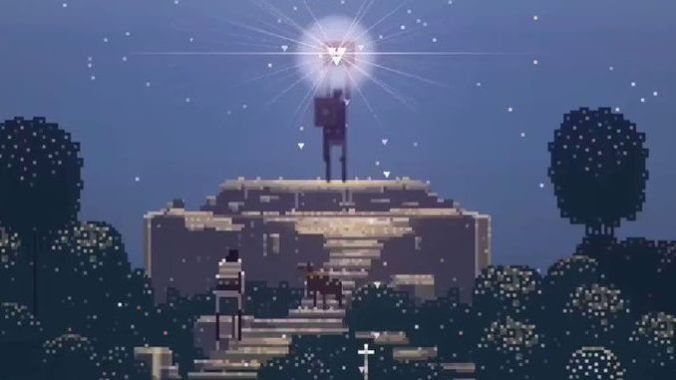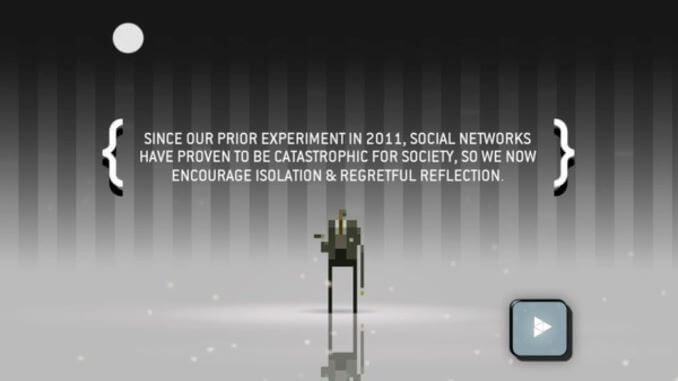And I feel fine. This is fine.
During the prelude to the game’s opening section, Session I, a narrator known as The Archetype tells the player “Our research indicates that social support networks will play a significant positive role in the outcome of S:S&S EP.” As someone who didn’t have much of a chance to play this indie classic until the year of Twitter’s inexorable decline, this line (and iterations of it throughout the game’s four sessions) is very bittersweet to read.
For instance, some players probably discovered from a friend that it’s true that you have to wait until there’s a full moon in real-life before you can access the dream sequence where the mystical yet terrifying Bright Moon Trigon piece resides. Or someone might let them know of other ways to get around real-time obstacles like finding the secret Moon Grotto or mucking about with their device’s calendar/time-zone. The goal was to inspire community discussion of a unique game project and what it meant to them. Twitter being the main hub of games’ discourse was important to this goal. And while the Twitter feature doesn’t make or break the game, it does comment on how the social media platform has often had an influential role in the games industry—for better or worse.
Twitter wasn’t exactly idyllic pre-2016; hell, it wasn’t anywhere near that even in 2014. But since at least the 2010s social media sites like Twitter, Reddit, Discord and Tumblr have been intertwined with games development and culture. Indie games like S:S&S EP wouldn’t have been nearly as successful without social media platforms like these. There also wouldn’t have been spaces to experiment and share things like Twitter-thread choose-your-own-adventure games, transmedia storytelling, and a whole host of indie Twine games which did important work not just for game narrative design but for giving voices to many marginalized creators’ experiences. In fact, marginalized creators and games-adjacent professionals have been able to find communities, start projects or careers, or even organize unions and protests via Twitter. With Twitter’s rapid decline under its new ownership, there has been understandable anxieties over how these communities and movements will become more fragmented as every individual user reckons with what alternatives match their needs and interests best. Not to mention that some social media sites, like Mastodon, have more of a learning curve for their sign up process than others. There’s been ongoing discussion of how joining multiple Discord servers has caused more exhaustion than it has solved the issue of replacing the central water cooler situation of Twitter. Overall there’s a sense of atomization at present, a scattering to the winds, and while adaptation will inevitably ensue, it’s easy to empathize with the nervous uncertainty of it all.
Of course, I’d be remiss if I didn’t mention that while digital word-of-mouth has connected esoteric projects to billions of potential users globally, it’s also exposed game devs to just as much direct toxic feedback from bad faith actors and hate campaigns.This double-edged phenomenon and its vast influence made up a significant portion of the 2012 documentary Indie Game: The Movie. Despite this, game devs and game dev hopefuls alike have flocked to Twitter over the years to learn from industry experts who offered deep but (more importantly) free and easily accessible advice.
For an industry that was quite opaque about its processes before social media’s prominence this, was invaluable knowledge. As experimental game dev, interactive artist, and games advocate Emilia Lazer-Walker (@lazerwalker) noted, most “documented institutional game dev knowledge is gated behind GDC Vault access (or internal studio talk archives)” and Twitter’s potential demise due to Elon Musk’s gross mismanagement of the company will mean “losing [a] history of long game design threads.” Such threads have helped many game design students and indie developers kick-start their careers, especially for those who cannot afford the costs of traveling and attending events like GDC.
I don’t think the end of Twitter or the loss of its relevance means that game development, especially indie game development, is also in decline. But I do think that what we’re experiencing right now is a symptom of the ongoing fallout from the last three years of the pandemic. Economic resources and assets have been dramatically redistributed during this period (Musk’s net worth has increased from $25 billion in March 2020 to over $180 billion today, an enormous expansion of personal wealth during a time of unusual pain, loss, and struggle for the vast majority of humanity), and Twitter being bought out and mismanaged is part of this. Couple this with the games industry’s current woes as a recession looms and it’s not hard to see how we’re in for a rocky time with games development and discourse for a while, at least. I know that eventually one of the contenders for the next primary social media platform will set itself apart from the pack (it seems Hive and Mastodon are neck and neck for this). Social media will reorganize itself as it usually does.
What I’m more interested in is how the context for how we all gather, talk and create for the games industry will change. In some ways, the online games community is going back to a previous internet model of being distributed over a number of different forums. Games releases and the discourse surrounding them will still be a common denominator for these different forums. But talk of games will be more segmented, idiosyncratic, and in some instances depending on the platform more private.
Keza MacDonald has concluded recently in her column Pushing Buttons that while the games industry won’t ever be the same after Twitter, society might be better off. I agree and feel that my current mindset is similar to the sentiments expressed by The Archetype in a screenshot they shared with Kotaku when asked to elaborate on their stance towards social media. They counseled “isolation and regretful reflection.” I don’t think we should all cordon ourselves off or feel wholly regretful about the state of affairs, but I do think that taking some time to decompress and take stock of what Twitter has wrought over the years is necessary. There’s been just as much progress as there has been chaos, and everyone has experienced this chaos unequally.
Phoenix Simms is an Atlantic Canadian writer and indie game narrative designer. You can find her work at Unwinnable, Videodame, Third Person, and her portfolio. Her stream-of-consciousness can be found at @phoenixsimms.

